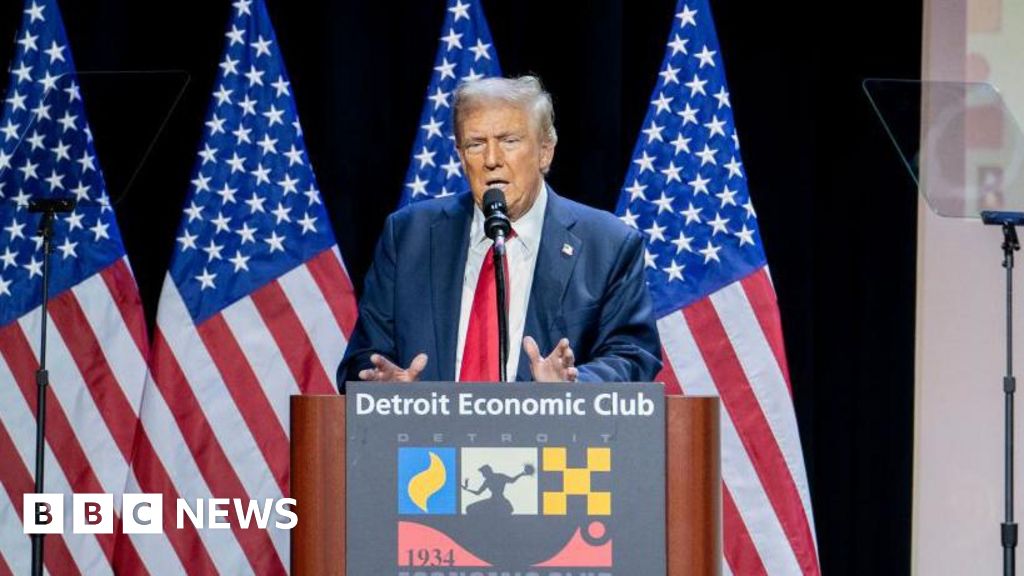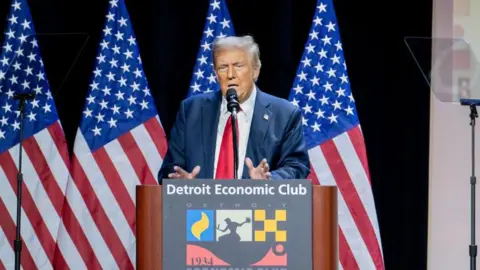
 Getty Images
Getty ImagesA longtime resident of the north Detroit suburb of Warren, Michigan, Doug spends part of his days building electric vehicles for Ford as a machine repairman.
But he would never buy one.
A former Democrat and unionised auto worker, Doug – who declined to share his name for fear of pushback from his union – is exactly the type of Michigan voter Donald Trump is working to recruit and Kamala Harris is eager to win back.
With less than a month before election day, the former president has been stoking fears in the state that Harris wants to ban gas-powered vehicles and that auto workers could lose their jobs in the push to electrify cars. The message is resonating with Doug and some other Michigan voters who spoke to the BBC.
“It could definitely cost us our jobs, and it already has cost a lot of people their jobs,” Doug told the BBC on a sunny October day outside a Meijer supermarket in Warren.
Harris has pushed back on Trump’s rhetoric, telling voters at a rally in Flint, Michigan, last week that her administration would not put a stop to vehicles that use petrol. The vice-president endorsed phasing out petrol cars when she ran for president in 2019, but has since reversed her support for the policy.
“Michigan, let us be clear,” she said in Flint, “Contrary to what my opponent is suggesting, I will never tell you what kind of car you have to drive.”
Experts say Trump’s electric vehicle criticism is his Michigan spin on a broader economic message as he tries to appeal to voters in the key midwestern swing state.
Speaking to a crowd of hundreds at a Detroit Economic Club event on Thursday, the former president doubled down on the message, saying that United Automobile Workers president Shawn Fain wanted “all electric cars”, a move Trump said was costing the auto industry their “whole business”.
“That has just become a front message of Republicans: that these plans or hopes to electrify the vehicles are going to destroy the auto industry and take away jobs,” said Jonathan Hanson, a lecturer at University of Michigan’s Gerald R Ford School of Public Policy.
And Harris’s challenges to that message haven’t broken through to some Michigan voters, who still believe Trump’s claim that Harris wants a country of entirely electric vehicles.
“I don’t trust them,” 82-year-old Warren resident Ruth Zimmer said of electric cars. “I want it to be the way it always was, with a good, old-fashioned car.”
On Friday in Michigan, Harris’s running mate Minnesota Governor Tim Walz tried to appeal to those sceptical of electric vehicles and took aim at Trump’s comments about mandates.
“It should just be your choice. We need to make those choices affordable and available to people,” he said. “Nobody’s mandating anything to you. If you want to drive, like I do, a ‘79 International Harvester Scout that is sweet as hell … knock yourself out.”
Walz and Trump’s visits to the state comes as recent polls suggest Harris’s support may be slipping slightly in the key battleground state. A September poll from Quinnipiac University found Trump ahead by three points in Michigan, after other polls suggested Harris had been leading by a slim margin for the past month.
Trump’s attacks on electric vehicles are also complicated by one of his biggest supporters, billionaire Elon Musk, the founder of Tesla, an electric car company. Musk has endorsed Trump and appeared at his rally in Butler, Pennsylvania, last week, cheering him on from behind the podium.
Appealing to the state’s automobile and union worker population – once a staunchly Democratic voting bloc – will prove key for Harris and Trump to close the gap in Michigan, experts say.
Trump picked up a number of these voters in the state in his 2016 race against Hillary Clinton, though President Joe Biden won some of their votes back in 2020. Nationally, Clinton ended up winning 51% of union households, compared to Trump’s 42%, in a race she lost in Michigan by some 10,000 votes. Biden won union households 56% to 40%, according to 2020 exit polls.
Some former Democratic union workers in Michigan have grown disillusioned with the party as the cost of living has risen. Doug, the Warren resident, said adding that pressure from his union leadership to stay in line with Democrats had turned him off.
“You must be a Democrat, or you’re totally exiled,” Doug said.
Harris, he added, was just President Joe Biden “in a nutshell”.
The vice-president is struggling to win over the labour vote more than Biden, who had cast himself as the most pro-union president in history. Though Harris and Walz have key labour endorsements, they’ve struggled to earn support from rank-and-file union members.
For the first time in three decades, the International Brotherhood of Teamsters – the largest union in the country – declined to endorse a presidential candidate, finding a majority of its rank-and-file members supported Trump.

In Michigan, where the automotive and transportation industry employ 20% of the workforce, Democrats are not getting as much credit as they had hoped for their electric vehicle investments in the state, said Matt Grossmann, a politics professor at Michigan State University.
This year, the Biden-Harris Administration announced a $1.7b (£1.3b) investment to convert shuttered and struggling auto plants in Michigan and several other mid-western states to manufacture electric vehicles and parts of their supply chain.
“Many in the auto industry and surrounding it don’t necessarily think that that would benefit Michigan,” Mr Grossmann said.
Automakers broadly seem to be on board with shifting their fleets over to more electric vehicles, Mr Hanson said, but the transition is expensive and requires complementary investments in factories for special materials such as batteries.
As a part of the nearly $2b federal investment, a General Motors factory in Lansing, Michigan, has received $500m to shift production from petrol to electric vehicles.
In Detroit just two days before Trump arrived, his Republican running mate JD Vance said the Lansing investment was “table scraps” compared to the job losses that would be on the horizon from the shift to electric vehicles.
Kevin Moore, the president of the Teamsters union in Michigan, called Trump and Vance’s electric vehicle claims a “bold-faced lie”.
“They’re not going to get rid of combustible, gas vehicles,” he told the BBC. “They can coincide together.”
His group – and several Teamsters unions in swing states – have endorsed Harris for president.
Moore said he believed Michigan workers would not buy into Trump’s statement that electrification would cost auto workers their jobs.
“They’re astute,” he said of auto workers. “Donald Trump was a gold spoon-fed billionaire. [Harris] lived her life in middle-class America.”



